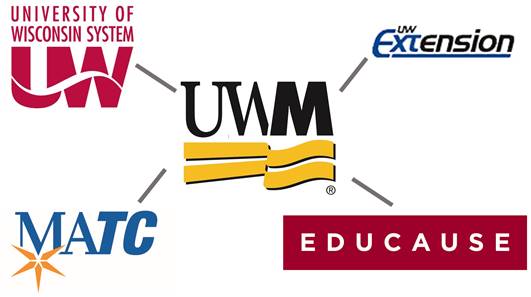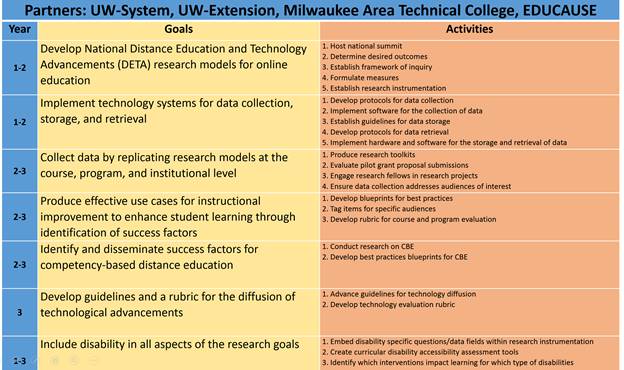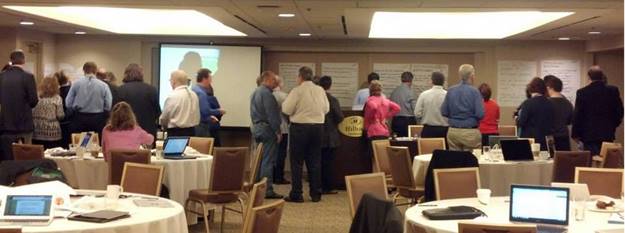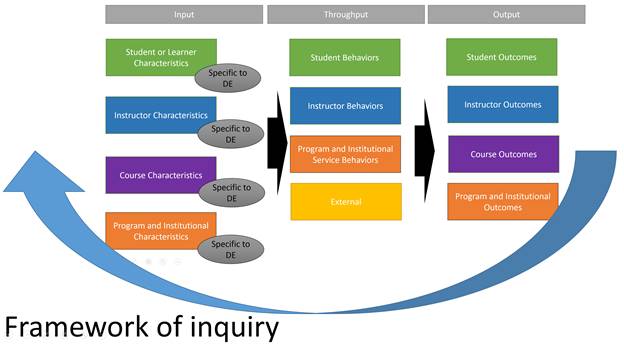Key Takeaways
- The National Research Center for Distance Education and Technological Advancements arose in response to a national push to improve student access to a quality higher education.
- The Fund for the Improvement of Postsecondary Education grant focuses on identifying instructional and institutional practices across the United States that can grow student success.
- Work over the coming months will result in finalization of the research model.
- Elements of the planned research toolkits will include research questions, measures, instrumentation, and more.
Tanya Joosten, Director, eLearning Research and Development, and Co-Director, National Research Center for Distance Education and Technological Advancements, University of Wisconsin–Milwaukee
A push to improve student success by providing access to high-quality online, blended, and competency-based education (CBE) led to establishment of the National Research Center for Distance Education and Technological Advancements (DETA) in October 2014. The United States Department of Education (USDoE) had received funding from the U.S. Congress in order to provide higher education the attention and resources to better understand the impact of distance education, and these resources supported the launch of a much-needed effort to identify and document key factors that impact student access and success — DETA.
Funding for Access
The USDoE Fund for the Improvement of Postsecondary Education (FIPSE) awarded the University of Wisconsin–Milwaukee (UWM) a 1.48 million, three-year grant to launch the DETA (pronounced "data") Research Center this past fall. These efforts aim to help ensure access to quality higher education for all students. Specifically, the grant's focus is to identify instructional and institutional practices in online education across the United States that can increase student success. Through an array of activities, the grant will achieve seven goals over three years as outlined in the awarded proposal.1
As co-director of the DETA Research Center and co-principal investigator of the grant, here I will discuss the background of the grant, the project design, the progress made thus far in year one, and the next steps for years two and three.
Background
Many institutions work to ensure that they provide students access to a quality higher education. One way to do this is through distance education, in particular online and blended degree programs. More recently, interest has turned to the potential of improving access for certain populations through competency-based education programs (CBE). The UW Flexible Option at UWM, for example, gives working adults with extensive career experience the opportunity to obtain one of three undergraduate degrees. Additionally, institutions want to ensure high-quality instruction and learning opportunities in these distance education programs to positively influence student success.
UWM faculty began exploring online course delivery in the 1990s using instructor-made web pages, digital materials delivered on CDs, and e-mail Listservs. Soon after, the UW System awarded grants to UWM to fund pilots to support organized and concentrated efforts focusing on innovative ways of learning with technology. These grant awards included:
- the Teaching Assistant and Faculty Collaborative Web Project for the piloting of course management systems (now called learning management systems) to enhance teaching and learning (1999); and
- the Hybrid (or blended) Learning Course Project (2001) for the piloting of a new pedagogical model including face-to-face and online mediums or mixed modes [http://www4.uwm.edu/ltc/hybrid/], which led to the development of the UWM faculty development program.
Goals
In an effort to increase student access and success, the DETA Research Center has partnered with the University of Wisconsin System, the University of Wisconsin-Extension, and Milwaukee Area Technical College to produce recommendations for instructional and institutional practices in distance education. Together, key factors affecting student outcomes will be identified in order to increase instructional effectiveness. Moreover, the group wants to ensure that educational practices impact all audiences, so research will pay particular attention to people with disabilities, minorities, socioeconomically disadvantaged students, and adult learners. These recommendations will be shared with instructors and institutions across the nation through effective use cases. The EDUCAUSE Learning Initiative (ELI), a DETA partner, will assist the grant efforts by sharing the products through their Seeking Evidence of Impact (SEI) web repository. Figure 1 shows the initial partners.

Figure 1. Original partners in the DETA grant
Grant Structure
To produce these recommended practices, the focus thus far has been on developing a research model that will inform DETA research toolkits. This will provide a coherent foundation to situate and facilitate rigorous cross-institutional research to be conducted in grant year two, which will in return produce these effective use cases in grant year three.
- Year 1: The DETA Research Center and its partners will work with distance education experts and other stakeholders to develop a research model that will be the foundation for the DETA research toolkits. These toolkits will be used by researchers and practitioners across the country to conduct cross-institutional research in line with the grant goals.
- Year 2: The DETA Research Center and its partners will disseminate two requests for proposals (RFP) and award funding to U.S. institutions selected to become research partners. The first RFP will be open to a wide variety of institutions, providing funds to conduct research on blended and online education using the DETA research toolkits. The second RFP will focus on institutions that offer competency-based education programs to conduct similar research. The DETA Research Center will work to gather data and results from grant awardees to aggregate findings for greater dissemination and potential further analysis.
- Year 3: The DETA Research Center and its partners will develop blueprints to facilitate the creation of effective use cases for faculty and institutions. The partners and grant awardees will construct these use cases and disseminate them through the DETA virtual community and the ELI SEI web resource. Furthermore, the findings will help inform a rubric for course and program evaluation.

Grant Progress
One of the first activities of the DETA Research Center was to hold a national summit. The summit objectives included:
- bringing key partners and research experts together,
- generating ideas and discussing critical issues to guide the DETA research agenda, and
- taking steps to help develop greater coherency in the field of distance education.
The summit, held during the 2015 ELI Annual Meeting, brought together faculty, instructors, researchers, student services staff, faculty development staff, administrators, key organizational leaders, and technology companies to determine relevant research questions around distance education.2
The DETA Research Center and its partners paid careful attention to the heterogeneity of the participants involved and established group composition for the discussions with the intent of enhancing the outcomes (figure 2). The post-summit evaluation survey revealed that participants appreciated the effort, rating the composition of the groups and the participants invited to the summit as the top two satisfactory outcomes of the summit. One attendee mentioned, "I think important foundations were laid at this summit, and the variety of people in the room was key."

Figure 2. Voting at the summit
The summit's overarching goal was for participants to brainstorm and suggest key areas of research that should be addressed in the coming year. The objective was accomplished by asking participants to identify and prioritize research questions. One participant noted, "The summit led to many conversations that exposed topics from diverse institutions that will lead to broad-based and inclusive research questions." Emerging from the summit's data are seven top research questions:
- What are the definitions of success from students' perspective?
- What are the different design components (content, interactivity, assessments) that impact student learning?
- What patterns of behaviors lead to increased student learning for different populations?
- How can we define and measure student success beyond traditional outcomes?
- What support structures are critical to providing quality access to online instruction?
- What is the currency of student learning beyond the existing credit hours?
- What are the key components that promote a sustainable and effective teaching and learning ecosystem?
Next, the DETA Research Center involved participants in developing a framework of inquiry to guide not only research as part of this grant but also future research in the field of distance education. The framework of inquiry includes variables from a systems approach, developing greater understanding of the path of distance education at multiple levels. This includes input, throughput or process, and output variables. These variables range from micro to macro levels, including student, instructor, course, and program or institutional variables (see figure 3). Dozens of variables were identified, and the participants prioritized the variables of most importance through voting.3 As one of the participants commented, "…seeing the process of getting researchers from all over the county to come together and create something new was incredible."

Figure 3. Assignment of variables by level
The research model and framework of inquiry will inform the development of the research toolkits to be shared with other institutions, especially grant awardees determined by the RFP administered in year two of the grant. The toolkits will provide methodological guidance in conducting research, which is a greatly needed resource to facilitate more research in distance education in general and in particular to ensure that research across institutions can be aggregated for richer knowledge generation about key factors that influence student success for all students.
Status
The DETA Research Center completed an analysis of the data gathered from the summit through the group activities and post-summit survey.4 This work included the quantitative and qualitative analysis of the survey, qualitative analysis of the meeting notes, quantitative analysis of the research questions, and quantitative analysis and supplemental research to develop the framework of inquiry as described above. The analysis led to some interesting findings beyond the prominent research questions and comprehensive list of variables to be included in the framework of inquiry:
- First, participants indicated a desire for national standards in defining distance education, online education, blended education, and competency-based education.
- Second, participants wanted an enhanced understanding of student success beyond traditional empirical measures, focusing on success beyond grades and the credit hour and students' perspective of success.
- Third, the qualitative analysis of the discussion variables to include in the framework of inquiry supported the quantitative analysis and revealed an emphasis for particular sets of variables, including student characteristics and behaviors, course mode, faculty or instructor characteristics, and instructional characteristics.
Work over the coming months will result in the finalization of the research model. Elements of the research toolkits including research questions, measures, instrumentation, and more will be determined, providing faculty and institutions with the guidance they need to conduct rigorous research. Furthermore, the DETA Research Center will engage the distance education community in collaborative efforts to inform the work of the grant.
Future Plans
The DETA Research Center will acquire and develop the technological infrastructure needed to provide a cloud-based open data system. This system will be used to gather data from the DETA grant awardees for further aggregated analysis. Most importantly, this data can be used by researchers across the country in years to come to conduct additional research within the framework of inquiry the DETA Research Center establishes.
To Become Involved
If your institution is interested in joining the DETA Research Center efforts, please consider submitting a proposal as part of the DETA grant award process. The RFP will be available in year two of the grant. Can't wait till then? You can join the virtual community. One of the underlying values guiding the DETA Research Center plan is to provide an open and transparent process; therefore, we will be looking for feedback and participation from the distance education community.
In the meantime, please feel free to connect with us on social media. You can find us on Twitter at @UWMDETA or twitter.com/UWMDETA using hashtag #DETAResearch and on Facebook at facebook.com/UWMDETA.
- See the DETA Resources page for a copy of the grant summary distributed by the USDoE and the winning proposal.
- The summit web page links to a list of participants.
- The DETA research model web page includes a link to the variables.
- The link to a report on the analysis can be found on the summit web page.
© 2015 Tanya Joosten. The text of this EDUCAUSE Review article is licensed under the Creative Commons Attribution-NonCommercial 4.0 license.
